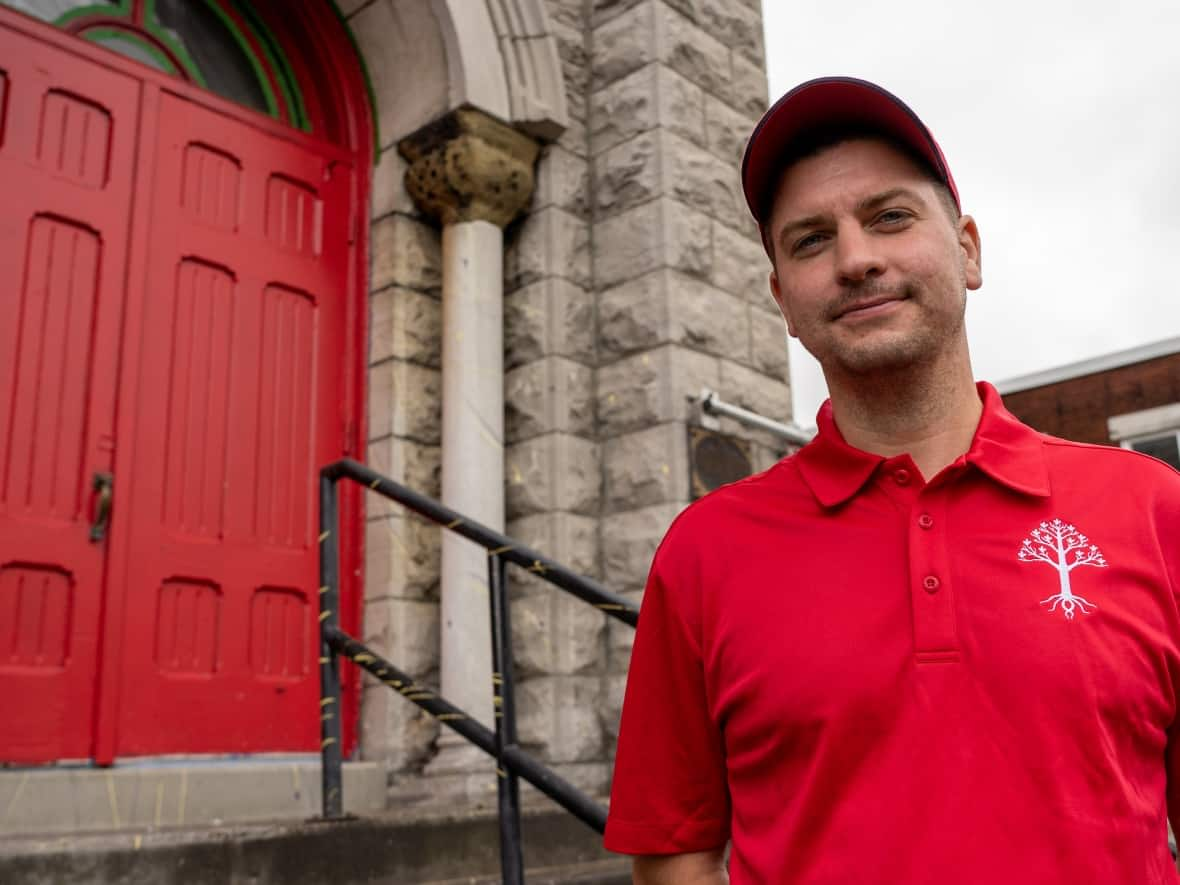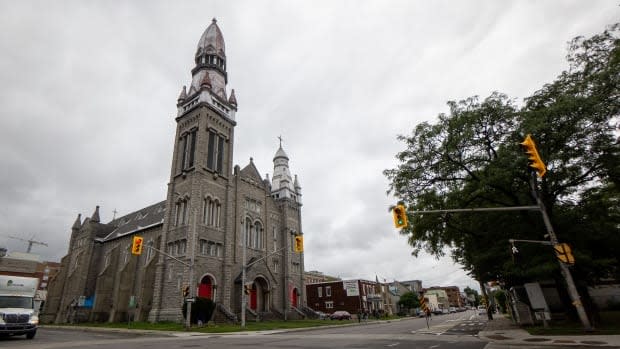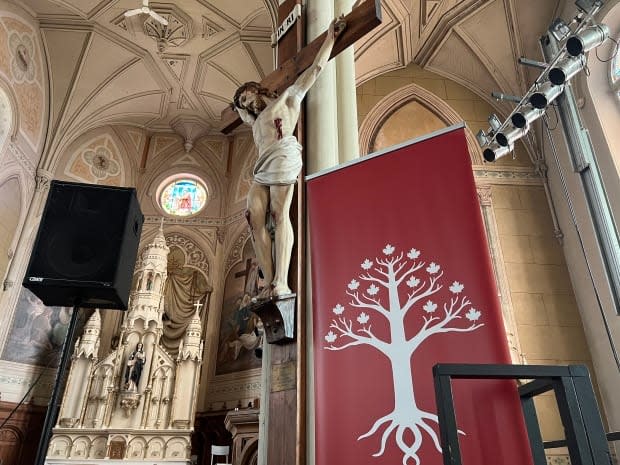TUPC says it's prepared to use private prosecution at St. Brigid's. Here's what that means

William Komer says his experience with private prosecution in London, Ont. — after he unsuccessfully argued that police discriminated against him on the basis of his gender — gives him confidence The United People of Canada's (TUPC) efforts to stay in an Ottawa church they're being evicted from will succeed.
But he provided no evidence that he was successful, and no avenue to verify his claims.
Komer is a director of the controversial group with ties to the Freedom Convoy that set up shop at St. Brigid's in recent months. He said the organization has private prosecutions ready and is prepared to pursue the rarely used legal option to assert its right to stay at the former church, where the owner is evicting TUPC.
Canada's Criminal Code allows anyone who believes an offence has occurred to start a private prosecution, according to Karen Bellinger, a staff lawyer at the University of Toronto's Downtown Legal Services.
It's generally done when police have declined to lay charges in situations such as a dispute between neighbours, she added.
"People will go to a justice of the peace to lay a private prosecution as a last resort," Bellinger said. "In my experience it usually is borne out of a longstanding dispute or spite, or sometimes [is] retaliatory."
Intended targets unknown
TUPC has not said who it would file private prosecutions against, but it has spoken out against Mayor Jim Watson, people protesting their presence at the church, the leader of a community association and a bailiff. The latter has said TUPC is "basically squatting," and has been trying to evict them for days on behalf of the building's owners.
Experts describe private prosecution as a legal move that comes with many hurdles, as well as a "ripcord" the Crown can pull at any point to end the process.
"In all cases of a private prosecution, the attorney general can intervene, take over the case, continue it or stay it at their discretion," said Benjamin Berger, a professor at Osgoode Hall Law School in Toronto.
There are so many hurdles, in fact, that Berger said it's fair to say modern criminal law in Canada "expresses a lot of concern and skepticism about private prosecutions."
But Komer said he's gained valuable experience dealing with the legal tool, specifically regarding a complaint he's made against the London Police Service.
Complaint against police dismissed 3 times
In October 2021, Komer filed a complaint with the London Police Services Board alleging its officers discriminated against him on the basis of his gender in a matter involving his spouse. The force's independent review board in November decided not to investigate, saying it wouldn't be in the public interest to do so.
He then complained to the Office of the Independent Police Review Director (OIPRD), which also determined that investigating wouldn't serve the public.
Still not satisfied, Komer challenged the office's decision in Ontario Superior Court. The court dismissed the challenge this past April, ruling that "it would not be in the public interest to investigate."

According to court documents, Komer reported he had been locked out of his home and was unable to retrieve his belongings during a dispute with his spouse.
"Instead of assisting him the officers did not investigate his complaints and ordered him not to attend at his home and not to communicate with his spouse," the documents read.
"This was in stark contrast to the way that the police responded to the complaints that his spouse made against him. According to the applicant, his treatment by the police was part of a systemic problem of police discriminating against male victims of intimate partner abuse."
Court documents say Komer raised allegations of a negligent investigation and discrimination, but the main issue was his dissatisfaction with the outcome of his interaction with police, "particularly around gaining access to his former matrimonial home and his spouse's rights to corporate property."
Appeal filed
Komer told CBC he is seeking an appeal of the Superior Court's decision. Ontario Court of Appeal staff confirmed that leave to appeal the case had been filed on June 15.
But despite the dismissals and need for an appeal, Komer said Tuesday that he's had a "great amount of success" related to the incident in London with private prosecution, resulting in criminal charges for "all the offences against me ... if they weren't appropriately addressed by police."
[Private prosecution] usually is borne out of a longstanding dispute or spite, or sometimes [is] retaliatory. - Karen Bellinger, University of Toronto
CBC is unable to independently verify if Komer's private prosecution resulted in criminal charges or was even filed in the first place, as court staff can only search for them by name of the accused, which Komer declined to provide, citing privacy concerns.
Asked how his experience in London factors into The United People of Canada's intention to use private prosecution in Ottawa if necessary, Komer said only that the two situations present "similar fact scenarios."
The organization frequently mentions private prosecution on social media and in interviews, sharing on Twitter Friday that a justice had apparently approved criminal charges against two people, and bragging of its "100% success rate in approval of our informations laid."
Komer said the charges mentioned on Twitter are not related to St. Brigid's in any way, though the group has "private prosecutions ready for here as well" if police don't act.
Ottawa police said Monday that officers had been called to the property three times over the weekend, and that the force is continuing to investigate a harassment complaint.
Staff at the Ottawa courthouse said private prosecutions tend to require a lot of time and resources, so they typically only handle about five per month. Any not filed before the end of August likely wouldn't go before a justice until October or November.
How the private prosecution process works
The first step involves going to the justice of the peace office at a courthouse and filling out a form laying out the facts.
If there are reasonable grounds the justice will ask for an information to be laid, and what's called a pre-enquete hearing will be scheduled.
That's where the person who filed the private prosecution will appear before a justice, who then decides whether to issue a court summons or arrest warrant, or whether the matter shouldn't proceed any further.

The Crown can also choose to withdraw the charge without the permission of the person who filed it if they believe proceeding isn't in the public interest or there's no reasonable prospect of conviction, said Bellinger of the University of Toronto's Downtown Legal Services.
"That's a virtually unreviewable decision by the attorney general," added Berger, the Osgoode Hall professor. "There's always that ripcord that the Crown can pull."
TUPC raises policing, discrimination concerns
Komer said the case he's appealing in London is separate from TUPC and its activities, but he's making some of the same complaints here in Ottawa.
He told CBC his organization has concerns about the service it's received from police after calling them to St. Brigid's in response to protestors.
Over the weekend, Komer also told reporters TUPC was being discriminated against by various organizations in Ottawa, from the Lowertown Community Association to the office of Mayor Watson, who has called the group "a bit of a joke."
Asked how TUPC had been discriminated against, the director said TUPC was being targeted because it's inclusive of all people and perspectives, including "freedom fighters."
He said the group intends to take legal action against the mayor and various community organizations, including all 3,608 signatories of a petition calling on the city to take over St. Brigid's or help another local organization do so.


